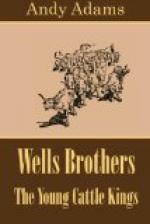A skirmish for grazing ensued. During the next few days there was little or no sunshine to strip the divides of snow, but the cattle were taken out and given every possible chance. The first noticeable abatement of the storm was at evening of the third day, followed by a diminishing fourth, when for the first time the herd was grazed to surfeiting. The weather gradually faired off, the cattle were recovering their old form, when a freak of winter occurred. A week from the night the blizzard swept down from the north, soft winds crept up the valley, promising thawing weather as a relief to the recent wintry siege. But dawn came with a heavy snow, covering the range, ending in rain, followed by a freezing night, when the snow crusted to carry the weight of a man, and hill and valley lay in the grip of sleet and ice.
It was the unforeseen in the lines of intrenchment. The emergency admitted of no dallying. Cattle do not paw away obstacles as do horses and other animals to reach the grass, and relief must come in the form of human assistance. Even the horses were helpless, as the snow was too deep under the sleet, and any attempt to trample out pathways would have left the winter mounts bleeding and crippled. The emergency demanded men, but two boys came to the front in a resourceful manner. In their old home in Ohio, threshing flails were sometimes used, and within an hour after daybreak Joel Wells had fashioned two and was breaking a trail through the sleet to the corral.
The nearest divide lay fully a mile to the north. To reach it with the cattle, a trail, a rod or more in width, would have to be broken out. Leaving their horses at the corral, the brothers fell at the task as if it had been a threshing floor, and their flails rang out from contact with the icy sleet. By the time they had reached the divide it was high noon, and the boys were wearied by the morning task. The crusted snow lay fully six inches deep on an average, and if sustenance was rendered the cattle, whose hungry lowing reached equally hungry boys, the icy crust must be broken over the feeding grounds.
It looked like an impossible task. “Help me break out a few acres,” said Joel, “and then you can go back and turn out the cattle. Point them up the broken-out trail, and bring my horse and come on ahead of the herd. If we can break out a hundred acres, even, the cattle can nose around and get down to the grass. It’s our one hope.”
The hungry cattle eagerly followed up the icy lane. By breaking out the shallow snow, the ground was made passably available to the feeding herd, which followed the boys as sheep follow a shepherd. Fortunately the weather was clear and cold, and if temporary assistance could be rendered the cattle, a few days’ sunshine would bare the ground on southern slopes and around broken places, affording ample grazing. The flails rung until sunset, the sleet was shattered by acres, and the cattle led home, if not sufficiently grazed, at least with hunger stayed.




